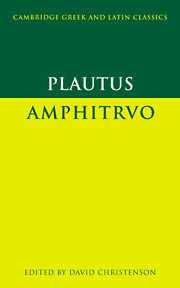Background and sources
from Introduction
Published online by Cambridge University Press: 05 March 2013
Summary
The myth
The story of Zeus’s impregnation of Alkmene and the subsequent birth of Herakles is of great antiquity, and belongs to the densely populated catalogue of Zeus’s amours. These myths in general reflect the desire of various localities to establish a connection with the Indo-European sky god and also illustrate ‘the rules of an extreme patriarchal family order which permits the dominant male all freedom’. The story is referred to (in an allusive manner suggesting its familiarity) by Agamemnon at Il. 19.95-133 within a speech intended to illustrate that even Zeus is subject to Ate. At issue there is the deception of Zeus by Hera, who manages to ensure the eventual sovereignty of Eurystheus over Herakles by delaying Alkmene’s parturition and accelerating that of the unnamed ‘wife of Sthenelos’, who gives birth to Eurystheus prematurely at seven months. An even briefer notice occurs at Od. 11.266-8 when Odysseus recounts that in Hades he saw Alkmene, ‘the wife of Amphitryon, who bore mighty, lion-hearted Herakles after she lay in the arms of great Zeus’.
It is the Scutum attributed to Hesiod but usually dated to the sixth century that provides the first detailed narrative (1-54) of the affair of Zeus and Alkmene. Here we learn that after he killed Alkmene’s father in some sort of dispute over oxen, the Argive Amphitryon took refuge in Thebes with her, though she refused to consummate their marriage until he had avenged the death of her brothers at the hand of the Taphians and Teleboans, and so Amphitryon launched an expedition against them. Zeus meanwhile, according to the [Sc.] account, has developed a powerful passion (31) for Alkmene, who is outstanding among mortal women in beauty, stature, and intellect (4–6). He therefore devises a stratagem one night (30–4) to gain access to Alkmene’s bed, presumably appearing in the guise of Amphitryon, though this is not stated explicitly. Zeus sleeps with Alkmene on the same night that Amphitryon is to return from the successfully completed campaign against the Taphians and Teleboans (35–8).
- Type
- Chapter
- Information
- Plautus: Amphitruo , pp. 45 - 55Publisher: Cambridge University PressPrint publication year: 2000

